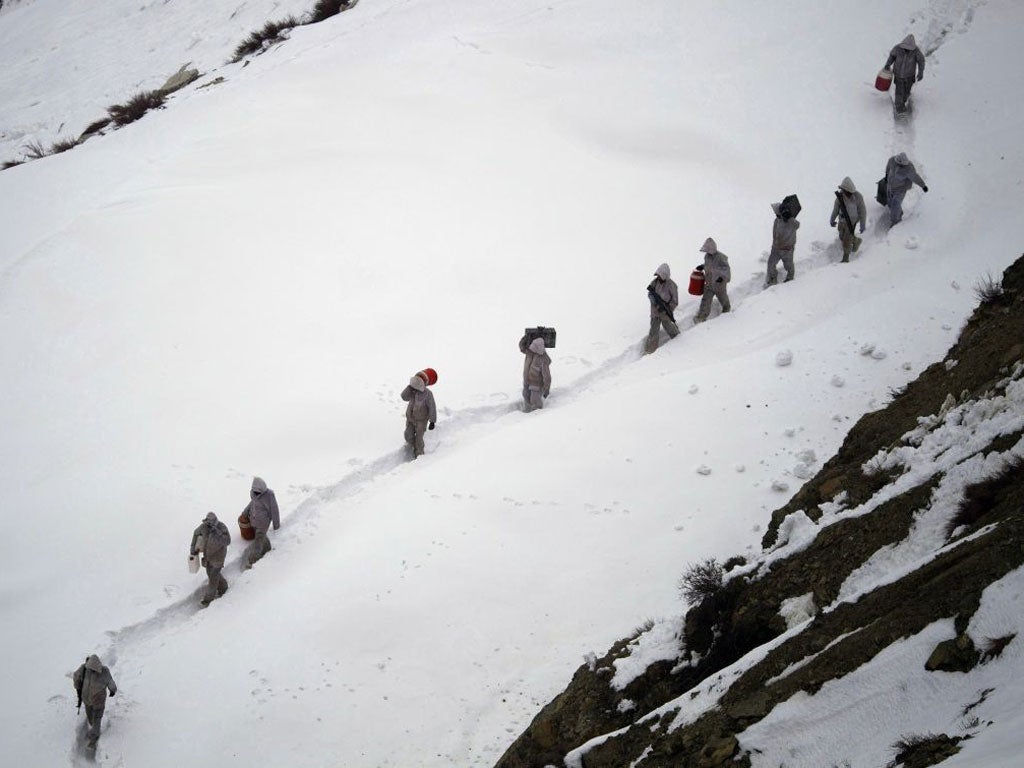Avalanche kills more than 100 soldiers in Pakistan
Many still missing as 80ft of snow smashes army base on Siachen Glacier near Indian border

Pakistan's military forces were last night struggling to reach more than 100 soldiers feared dead after an avalanche swept through an army camp located close to a remote area which has been termed the world's highest battleground.
Reports suggested that while the bodies of some of the 135 or more missing troops and personnel had been retrieved, the majority were still covered by snow and debris more than 12 hours after the avalanche. There was no word on possible survivors.
"We are waiting for news and keeping our fingers crossed," an army spokesman, Major-General Athar Abbas, told Associated Press. "It's on a massive scale. Everything is completely covered."
The avalanche struck yesterday morning at the base located on Siachen Glacier, close to the border with India. The headquarters of the base was buried in up to 80 feet of snow. Sniffer dogs, mechanical diggers and hundreds of troops were looking for the missing men, but progress was slow, said the spokesman. Siachen has become infamous in the wars and clashes between India and Pakistan. It sits on the northern tip of the divided Kashmir region and temperatures are said to fall as low as -60C. Troops have been stationed at anywhere up to 22,000ft.
The thousands of troops from both Pakistan and India who are based there – with numbers reaching anywhere up to 20,000 in all – have to deal not just with the brutal weather, but altitude sickness, isolation and high winds.
Experts say more troops have died from the tough conditions and avalanches than from actual fighting. There have been skirmishes since 1984, though the area has been largely quiet since a ceasefire in 2003. Pakistan's Prime Minister, Yousuf Raza Gilani, said he was shocked by what had happened, but said it "would in no way undermine the high morale of soldiers and officers".
The base that was hit was located in the Gayari sector, which sits at around 15,000 feet and is the main gateway through which troops and supplies pass on their way to other more remote outposts in the sector. It is situated in a valley between two high mountains.
Conflict there began in 1984 when India occupied the heights of the 49-mile-long glacier, fearing Pakistan wanted to claim the territory. Pakistan also deployed its troops. Both armies remain entrenched, despite the ceasefire, which a number of commentators believe highlights the futility of conflict between the two countries.
Ayesha Siddiqa, an Islamabad-based analyst, said last night that over the years Indian and Pakistani leaders – Benazir Bhutto and Rajiv Gandhi, and Pervez Musharraf and Manmohan Singh – had come close to agreeing to the demilitarisation of the glacier. She claimed the stumbling block had been the Indian military. "It's a very foolhardy situation," she added.
The avalanche happened the day before President Asif Ali Zardari of Pakistan travelled to India to meet the Indian Prime Minister, Manmohan Singh. It represents the first visit to India by a Pakistani head of state since 2005 and comes as the tense relationship between the two countries is slowly easing.
Join our commenting forum
Join thought-provoking conversations, follow other Independent readers and see their replies
Comments
Bookmark popover
Removed from bookmarks